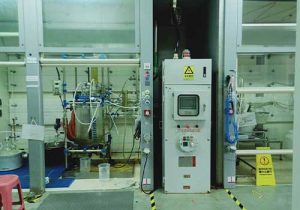small water chiller system
Small water chiller systems are increasingly becoming the go-to solution for applications that require precise temperature control in confined spaces. These systems are designed to be compact, energy-efficient, and easy to integrate with existing equipment, making them ideal for a range of industries.

Key Features of Small Water Chiller Systems:
Compact Design: Small water chillers are designed to fit into tight spaces, making them perfect for laboratories or areas with limited room for large equipment.
Energy Efficiency: These chillers use less energy compared to larger models, which can lead to significant cost savings over time.
Precision Temperature Control: They offer accurate temperature regulation, which is crucial for processes that are sensitive to temperature fluctuations.
Benefits of Small Water Chiller Systems:

Space Saving: The compact size allows for easy installation in areas with limited space, making them ideal for small-scale operations or where floor space is at a premium.
Versatility: They can be used in various applications, including cooling for laser cutting machines, medical equipment, and laboratory processes.
Cost-Effective: The lower energy consumption and reduced maintenance requirements make small water chiller systems a cost-effective choice.
Selecting the Right Small Water Chiller System:
When selecting a small water chiller system, consider the following factors:
Cooling Capacity: Ensure the chiller can meet the cooling demands of your application.
Type of Chiller: Choose between air-cooled or water-cooled models based on your specific needs and available resources.
Energy Efficiency: Look for chillers with high COP (Coefficient of Performance) ratings for optimal energy efficiency.
Maintenance Tips for Small Water Chiller Systems:

Proper maintenance is crucial for the efficient operation and longevity of small water chiller systems. Some key maintenance tips include:
Regular Inspections: Perform routine checks of the chiller’s components to ensure they are functioning correctly.
Cleaning: Keep the chiller and its components clean to optimize heat exchange and prevent the buildup of scale or other deposits.
Filter Maintenance: Replace filters as needed to maintain proper water flow and heat exchange efficiency.
Conclusion:
Small water chiller systems offer a versatile and efficient cooling solution for a variety of applications. Their compact design, energy efficiency, and precise temperature control make them an excellent choice for spaces where a full-sized chiller may not be feasible. By selecting the right system for your needs and following a regular maintenance schedule, you can ensure the optimal performance and longevity of your small water chiller system.
Related recommendations
Heating and Cooling Equipment for Fermenters
1353Heating and Cooling Equipment for Fermenters The fermentation tank needs to be controlled by a refrigeration and heating temperature control system during operation. The high and low tempera...
View detailsoil & gas process chiller
310IntroductionIn the complex and energy - intensive oil and gas industry, maintaining precise temperature control is crucial for efficient and safe operations. Oil & gas process chillers play a ...
View detailssmall water chiller unit
855Small Water Chiller Units: Efficient Cooling for Limited Spaces Small water chiller units are increasingly becoming the cooling system of choice for a variety of applications where space is at ...
View detailswater bath in the laboratory
535Introduction to Water Baths in the LaboratoryWater baths are indispensable in laboratory environments for their ability to provide a stable temperature environment for a multitude of scientific ap...
View details
 LNEYA Chiller
LNEYA Chiller





HelloPlease log in